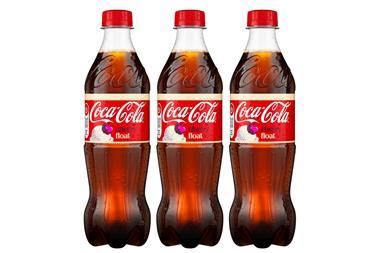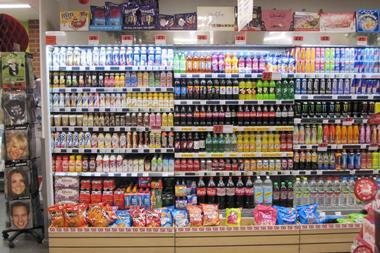Smart manufacturers are 'doing an Innocent' and capitalising on
the health food revolution currently sweeping the UK snack market
As the health debate continues to rage, the industry is having to respond with healthier products, portion-controlled pack formats and reformulations.
According to Gareth Pugh, consultant at marketing company Dragon Brands, Innocent Drinks is the star performer in the healthy impulse category: "The price point, personality, feel of the packaging, tone of voice and mouthfeel all combine to make a winner."
Pugh believes that snack companies are following Innocent's lead and are well placed to capitalise on its legacy. "The smart money is on companies such as Tyrrells that are 'doing an Innocent' with their brand proposition," he adds.
Consumers will spend more than £1.50 on a single impulse drink, according to Stephanie Kean, manager of smoothie and desserts company The Serious Food Company, due to the quality of ingredients and the opportunity to meet their five-a-day target: "The average price for a 250ml smoothie is three times that of other chilled juices. In the same way that Red Bull broke the price barrier in the carbonates sector, smoothie brands are doing the same for the whole drinks category."
Consumers' quest for healthy options has prompted big brands such as Walkers to focus on enhancing their better-for-you properties. Walkers Crisps were relaunched in early 2006 with a new look and recipe, and a £20m 'Eat Happy' campaign that promotes the 70% reduction in saturated fat. Meanwhile, UBUK has invested £5.5m on reformulating and marketing Hula Hoops, Skips and Mini Cheddars.
Cereal bars - previously viewed as healthy alternatives to confectionery countlines - have recently suffered from negative press in relation to high sugar levels. Clinton Orchard, marketing controller at Jordans, says: "Consumers know more about food and health benefits now, which is reflected in their impulse purchases."
The company's Frusli range will be relaunched this month with recipes improved for a more natural, fruitier taste.
Portion control is also proving an effective tool for indulgent products such as chocolate. Cadbury Trebor Bassett launched 99 calorie variants in early 2005 and smaller products are increasingly appearing on shelves. Masterfoods, for example, has replaced King Size formats of Snickers and Mars with a two-piece bar called Duo for greater portion control.
Consumers want snacks that are tasty and filling but also lower in fat and calories, according to research by Kraft Foods. This insight led to the launch of Philadelphia Splendips in August 2005, with fewer than 200 calories and
7g of fat. The brand is now worth more than £3m.
Yet portion control is not the answer in premium impulse, says Lucy Pitt, brand manager at Elizabeth Shaw. "When treating yourself or buying a gift on impulse, the last thing you want to be doing is talking calories," she says.
Instead, companies are launching initiatives such as 'Be Treatwise', in which major confectionery players are adopting GDA labelling.
Fiona Dawson, MD of snack foods at Masterfoods, says: "Be Treatwise provides consumers with information that lets them make informed decisions about what they eat and still enjoy treats."
Elizabeth Shaw's Pitt doubts they add much to impulse shoppers' knowledge. She says there is an underlying feeling in the impulse sector that companies should do what's best for their customers, rather than what they are forced into by the rest of the industry.
the health food revolution currently sweeping the UK snack market
As the health debate continues to rage, the industry is having to respond with healthier products, portion-controlled pack formats and reformulations.
According to Gareth Pugh, consultant at marketing company Dragon Brands, Innocent Drinks is the star performer in the healthy impulse category: "The price point, personality, feel of the packaging, tone of voice and mouthfeel all combine to make a winner."
Pugh believes that snack companies are following Innocent's lead and are well placed to capitalise on its legacy. "The smart money is on companies such as Tyrrells that are 'doing an Innocent' with their brand proposition," he adds.
Consumers will spend more than £1.50 on a single impulse drink, according to Stephanie Kean, manager of smoothie and desserts company The Serious Food Company, due to the quality of ingredients and the opportunity to meet their five-a-day target: "The average price for a 250ml smoothie is three times that of other chilled juices. In the same way that Red Bull broke the price barrier in the carbonates sector, smoothie brands are doing the same for the whole drinks category."
Consumers' quest for healthy options has prompted big brands such as Walkers to focus on enhancing their better-for-you properties. Walkers Crisps were relaunched in early 2006 with a new look and recipe, and a £20m 'Eat Happy' campaign that promotes the 70% reduction in saturated fat. Meanwhile, UBUK has invested £5.5m on reformulating and marketing Hula Hoops, Skips and Mini Cheddars.
Cereal bars - previously viewed as healthy alternatives to confectionery countlines - have recently suffered from negative press in relation to high sugar levels. Clinton Orchard, marketing controller at Jordans, says: "Consumers know more about food and health benefits now, which is reflected in their impulse purchases."
The company's Frusli range will be relaunched this month with recipes improved for a more natural, fruitier taste.
Portion control is also proving an effective tool for indulgent products such as chocolate. Cadbury Trebor Bassett launched 99 calorie variants in early 2005 and smaller products are increasingly appearing on shelves. Masterfoods, for example, has replaced King Size formats of Snickers and Mars with a two-piece bar called Duo for greater portion control.
Consumers want snacks that are tasty and filling but also lower in fat and calories, according to research by Kraft Foods. This insight led to the launch of Philadelphia Splendips in August 2005, with fewer than 200 calories and
7g of fat. The brand is now worth more than £3m.
Yet portion control is not the answer in premium impulse, says Lucy Pitt, brand manager at Elizabeth Shaw. "When treating yourself or buying a gift on impulse, the last thing you want to be doing is talking calories," she says.
Instead, companies are launching initiatives such as 'Be Treatwise', in which major confectionery players are adopting GDA labelling.
Fiona Dawson, MD of snack foods at Masterfoods, says: "Be Treatwise provides consumers with information that lets them make informed decisions about what they eat and still enjoy treats."
Elizabeth Shaw's Pitt doubts they add much to impulse shoppers' knowledge. She says there is an underlying feeling in the impulse sector that companies should do what's best for their customers, rather than what they are forced into by the rest of the industry.



















No comments yet